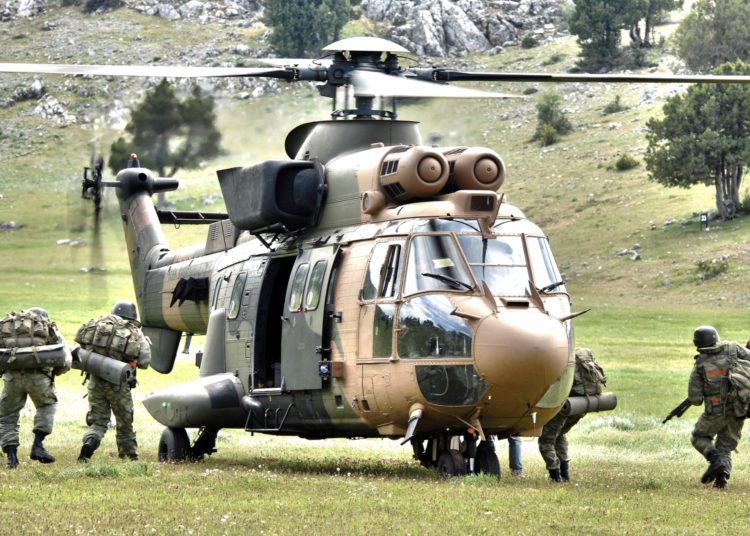Abdullah Bozkurt
The commander of Turkey’s prestigious Army Aviation School (Kara Havacılık Okulu) was subjected to torture in police custody, documents obtained by Nordic Monitor have revealed.
Brig. Gen. Ünsal Coşkun, head of the aviation school at Güvercinlik Army Air Base in the Turkish capital, was beaten by the police and deprived of food for two days, according to his own testimony on July 17, 2016. He was detained and arrested on charges of involvement in a failed coup on July 15, 2016. Deposed by prosecutor Alaattin Akdere, Coşkun explained how he and others were denied food and water while they were under police custody.
“When we asked to buy food and water from a nearby officers mess hall while we were under detention at Akincilar [Air Base], my friends and I were beaten by the police. I received punches by the police during these events. The people who beat me were three police officers. Punches landed on the left side of my head. I was injured because of that. The police punched, kicked and slapped my friends as well,” Coşkun said in a deposition taken at the prosecutor’s office.
When he and others were moved to another detention facility in the courthouse, they were given water and a bagel but not food. “I have been hungry for the last two days,” he complained. The general also recalled how he saw evidence of torture on the body of an officer from SAT, the Special Operations Forces unit of the Turkish Navy,who was held in detention next to him. “I saw dried blood on his back in the form of an X that was the result of a beating with a police baton,” he added.

The part of his testimony in which he detailed torture and ill treatment while in custody was hushed up by the Turkish media, under the near total control of the government of President Recep Tayyip Erdoğan, which provided blanket immunity to officials who were accused of engaging in torture and ill treatment of detainees.
Despite the fact that the general included the the account of torture in his statement, making it part of the court case file, the prosecutor did not launch an investigation into the police officers who allegedly tortured the defendant. Both the UN and nongovernmental organizations documented systematic torture in Turkey in the aftermath of the failed coup in July 2016. However, the deliberate practice of torture under the Erdoğan government has not ceased. Just recently over a dozen former Foreign Ministry diplomats were found to have been subjected to heavy torture while in police detention in the Turkish capital.
Defense attorney Tamer Yıldırım raised questions over the deposition his client provided while under duress, exhausted, tortured and deprived of food for two days. There might be inconsistencies in his statement given his condition at the time, the attorney noted.

Coşkun, who was accused of involvement in the failed coup, denied doing anything wrong other than following the orders given to him through the chain of command. In his defense statement at a court hearing on January 5, 2018 he said he was told the General Staff headquarters was under terrorist attack and that he was to coordinate helicopter flights from the base to help respond to the threat. He said he had never given any orders to shoot at civilians and added that he only allowed choppers to transport the wounded after he realized a coup attempt was under way.
His claims of torture have been corroborated with many similar statements given by other defendants in the case. The accusations in false statements that were extracted from suspects were widely reported, casting doubt on the authenticity of the confessions that the government claimed laid bare the culprits behind the coup attempt.
Coşkun’s statement also exposed the false assertion of Chief of General Staff Hulusi Akar, who claimed he was taken hostage by putschists and transported to Akıncılar Air Base from military headquarters. Coşkun said he planned his departure and return flights as VIP travel, suggesting he was not a hostage at all.
Commenting on a whistleblower claim that the National Intelligence Organization (MİT) compound was going to be attacked by armed helicopters, Coşkun said such military action could not be handled through Güvercinlik Army Air Base. Only the Special Forces Command (ÖKK) has the ability to organize such an attack with three helicopters, he explained. He questioned why then-Deputy Chief of General Staff Yaşar Güler, who was responsible for the ÖKK, did not share information on the planned coup that was provided by a whistleblower major at 14.30 hours on July 15. Coşkun testified that he found it quite odd that Güler did not launch a probe to question the alleged putschists named by the whistleblower nor did he share the tip with commanding officers.
The fate of the major, identified only by the initials O.K., still remains a mystery. He was later recruited by MİT and was prevented from testifying even as a witness in the trials. Coşkun also asked the court to hear the testimony of whistleblower O.K., but his motion was rejected.
The full statement by Coşkun is posted below:












